What are the implications of the latest Israeli attacks on Yemen?

More targets bombed in Yemen; another missile fired at Tel Aviv. Israel bombed Yemen yet again, hitting the main airport and port city. Israeli Prime Minister Benjamin Netanyahu warned there is more to come. In response, another Houthi missile was fired at Tel Aviv. So, how dangerous are these escalating hostilities? Presenter: James Bays Guests: Mustapha Noman – Former Yemeni deputy foreign minister Yossi Beilin – Former Israeli cabinet minister Elijah Magnier – Military and political analyst and Middle East specialist Hussain al-Bukhaiti – Pro-Houthi journalist and political commentator Adblock test (Why?)
Leaving X: The right move or a leap into the unknown?

Recent decisions by major news outlets like The Guardian and La Vanguardia and more niche publications such as Sex Tech Guide to leave X put under the spotlight a new dilemma experienced by global media: Should they stay on a popular platform that has become a primary source of fake news and hate speech to maintain relevance, or should they leave to uphold ethical responsibilities? Once the go-to place for any and all global discourse, X (formerly Twitter) has seen its reputation turn to rubbish under South African multibillionaire and self-declared free-speech absolutist Elon Musk. The ethical decline of X has gained momentum in the run-up to the 2024 US presidential election, as Musk made his political alignment with Donald Trump and his Make America Great Again movement clear, turning the platform into a megaphone for hate, racism and xenophobia. As neo-Nazi, white-nationalist accounts started to gain prominence, and racist pile-ons, doxxing and other abuse became a daily occurrence on the platform, several media outlets – but also millions of everyday users – made the decision to leave X for good. For them, leaving X clearly represented a moral stand against racism and hate, and the misappropriation of a platform that was once accepted widely as the global public square. But is media organisations migrating to alternatives, like Bluesky, a genuine solution, or does it risk creating new problems, such as ideological bubbles, financial losses, and diminished influence? Advertisement For many, remaining on X feels like tacit approval of the direction the platform took under Musk. For some news outlets, especially those whose corporate identity of progressive values take pride in their journalistic ethics, perceived association with the controversy-ridden platform of a far-right Trump surrogate is obviously unacceptable. However, X’s vast audience – still unrivalled by any other similar social media platform – remains an undeniable asset. The platform’s global reach and its ability to amplify messages cannot be ignored. Leaving it entirely may mean severing ties with a massive, global audience still relying on the platform for news, potentially leaving a vacuum that would be happily filled by less credible voices – or outright fake news machines. For those outlets fleeing X, Bluesky has emerged as an attractive alternative. A decentralised platform, it offers an environment where hate speech and misinformation are less prevalent. Its structure promises healthier, more values-aligned discourse. The point of Bluesky is not that it is free of disinformation, hate speech and fake news, but that its operation naturally reduces the reach of such content instead of promoting it – and that it offers additional tools to users to better control the information and content they consume. But Bluesky is not without flaws. Its user base is much smaller and its geographical reach much more moderate than X. Meanwhile, its design, critics say, risks creating ideological echo chambers: If Bluesky becomes a refuge primarily for liberal-leaning users and journalists, it could perpetuate the same insular dynamics critics say plague other alternative platforms. Advertisement The argument, however, falls apart when one considers the alternative X offers to Bluesky’s supposed ideological bubbles: social media that is open to all ideologies, but is driven by hate. As journalist and professor Marcelo Soares wrote, X “is not a public square, it’s a shopping centre. There are no debates in a shopping centre.” Unlike X, which thrives on conflict to drive engagement, Bluesky lets users take control of their experience, and select what goes on their own feeds without algorithmic manipulation. If someone chooses a bubble, it’s a personal choice, not a structural imposition. Meanwhile, X’s so-called alternative to bubbles replaces connection with hostility, turning the platform into a battlefield rather than a space for dialogue. There are other arguments against a collective move by media from X to Bluesky. As journalist Sophia Smith Galer observed on LinkedIn, Bluesky is a platform designed to cater to journalists rather than their audiences. It recalls an earlier era when journalists dominated Twitter’s ecosystem, engaging primarily with one another. This dynamic, while comfortable for those in the media, might not translate to meaningful audience engagement in a world where users are moving towards video-driven platforms like TikTok, YouTube, and Instagram. So opening up an account on Bluesky, where they could interact with like-minded colleagues directly, without facing much abuse from neo-Nazis and conspiracy theorists, would undoubtedly be a positive for journalists. Yet, does it offer a clear alternative to X for the organisations that want and need to share their content with wider and ever more diverse audiences? X, tragically, remains the only platform where media outlets can reach a vast – if not the best-behaved and receptive – global audience. Advertisement Leaving X also has practical, monetary implications for media organisations. Musk’s platform is still a major advertising revenue generator. X’s vast reach and user base make it a critical platform for driving traffic to news sites and attracting advertisers. Abandoning it risks shrinking audience engagement, which could affect revenue streams. Bluesky, Threads, and other alternative platforms are still in their infancy. Their smaller audiences and limited advertising opportunities make them less viable for organisations that rely on scale to sustain their operations. Media outlets must navigate this trade-off carefully: prioritising ethics while finding ways to maintain financial viability. Luckily for ethically concerned but cash-poor media outlets – and the entire humanity – Musk’s behaviour on X, and on the global political stage, is driving a lot of people away from X. Many of these people are finding refuge on Bluesky, meaning one day this new platform may actually become as profitable and useful as X for media organisations. Once the migration out of X is complete, and everyone who has an objection to the passing of disinformation, propaganda and hate as “news” has left the platform, serious media organisations would have no reason to remain there either. The exodus from X represents more than just a shift in social media strategy — it’s a reflection of the broader challenges facing journalism
NASA probe makes history with closest-ever approach to the Sun

Parker Solar Probe is operating normally after passing just 6.1 million kilometres above the Sun’s surface, NASA says. The United States space agency has confirmed its Parker Solar Probe is safe after making the closest approach to the Sun ever recorded by a human-made object. The probe passed just 6.1 million kilometres (3.8 million miles) above the Sun’s surface on December 24, the National Aeronautics and Space Administration (NASA) said early on Friday. It flew into the Sun’s outer atmosphere — known as the corona — “at a blazing 430,000 miles per hour [692km/h] — faster than any human-made object has ever moved”, the agency reported. NASA said its team had received a beacon signal late on Thursday, confirming that the probe had made its approach successfully and was operating normally. “Flying this close to the Sun is a historic moment in humanity’s first mission to a star,” Nicky Fox, head of the Science Mission Directorate at NASA headquarters in Washington, DC, said in a statement. Parker Solar Probe has made history. After seven days of silence, Parker has resumed communication with Earth, confirming it’s healthy after soaring just 3.8 million miles from the solar surface — the closest a human-made object has ever been to a star.https://t.co/YgLBDsRlGy pic.twitter.com/UMCNq0BzhA — NASA Sun & Space (@NASASun) December 27, 2024 Advertisement Scientists are hoping that the probe, which was launched in 2018, will help them learn more about Earth’s closest star. “By studying the Sun up close, we can better understand its impacts throughout our solar system, including on the technology we use daily on Earth and in space, as well as learn about the workings of stars across the universe to aid in our search for habitable worlds beyond our home planet,” Fox said. The craft is equipped with a shield that protects it from extreme heat in the Sun’s corona and can withstand temperatures as high as 1,400 degrees Celsius (2,600 degrees Fahrenheit), NASA has explained. With its close brush complete, the Parker Solar Probe is expected to circle the Sun at this distance through at least September. The craft is expected to send detailed telemetry data about its status on January 1, NASA said. Amitabha Ghosh, a NASA scientist, said experts still do not know so much about the Sun despite its monumental importance for life on Earth. “If the Sun was to stop shining even for a day, all life on Earth would be destroyed. We are so very dependent on the Sun and yet we know so very little,” Ghosh told Al Jazeera. He said the information that may be gleaned from the Parker Solar Probe could answer a series of important questions, including how the Sun heats up, how it transmits that heat, and what makes up what’s known as solar wind. “These are very important scientific questions to understand,” Ghosh said. Parker Solar Probe has phoned home! After passing just 3.8 million miles from the solar surface on Dec. 24 — the closest solar flyby in history — we have received Parker Solar Probe’s beacon tone confirming the spacecraft is safe. https://t.co/zbWT7iDVtP — NASA Sun & Space (@NASASun) December 27, 2024 Advertisement Adblock test (Why?)
Police group praises bill to give public sector retirees full Social Security benefits: ‘deserved and earned’

A law passed last week as Congress narrowly averted a partial government shutdown to address cuts in Social Security for some public sector workers was praised by law enforcement groups, despite criticism from opponents who said the cost would speed up the program’s insolvency. The Senate on Saturday overwhelmingly approved the Social Security Fairness Act, bipartisan legislation to repeal two little-understood rules: the Windfall Elimination Provision (WEP) and Government Pension Offset (GPO). The legislation effectively revokes 1980 rules that reduced benefits for public employees receiving state pensions. The bill was sent to President Biden. In the House, 327 members, and 76 Senators voted to stand with around 3 million retired firefighters, police officers, teachers, and other public sector workers who also receive pension payments, Mick McHale, president of the National Association of Police Organizations, told Fox News Digital. ON THIS DAY IN HISTORY, AUGUST 14, 1935, SOCIAL SECURITY IS SIGNED INTO LAW BY FDR “For over 40 years, the men and women, especially in the area of public safety… have been penalized as a result of the pension system that they belong to,” McHale said. Firefighters, police officers, postal workers, teachers, and others with a public pension have collected decreased Social Security benefits for jobs they held in the private sector because of WEP, which was designed to prevent so-called double-dipping from a government pension and Social Security. The GPO ensures spousal benefits are adjusted to reflect income from public pensions in an effort to prevent Social Security overpayments. “This is a victory for thousands of teachers, first responders, and public servants in Maine who, through service to their communities, have been forced to forego their earned retirement benefits,” said Sen. Susan Collins, R-Maine., the lead sponsor of the measure. BEWARE OF THIS SOCIAL SECURITY SCAM BY CROOKS TRYING TO TRICK YOU Critics of the bill argued it would cause more problems for Social Security moving forward. The legislation will add $196 billion to the federal deficit over the next 10 years, according to the Congressional Budget Office. Sen. Mike Lee, R-Utah., called the bill “fundamentally unfair,” saying it would impact millions who have paid into Social Security. “This bill would force those workers, 96% of them in America, to subsidize overly generous benefits for the 4% of the workforce, those who have not participated in Social Security and instead contribute to non-covered pensions,” Lee said on the Senate floor. Despite some criticism, Congress overwhelmingly favored changing the system, McHale said, “The men and women that are in Congress clearly recognized the unfairness that was being applied when it comes to a Social Security benefit, which was richly deserved and earned,” he said. He acknowledged that many retirees sometimes continue to work in other areas that pay into Social Security. “However, that time period that we were in the law enforcement profession is where the penalty is applied when we reach the golden years and we should be enjoying the benefits of our efforts,” he said.
Guatemala ready for more deportations under Trump, report says: ‘We know it’s coming’

Guatemala may accept more foreign nationals deported from the United States by the incoming Trump administration in an effort to strengthen ties to the U.S., according to a report. Officials who spoke to Reuters said Guatemala is willing to receive deported citizens of other Central American countries – such as Nicaragua, Venezuela and Haiti – which have strained relationships with the U.S. and have not accepted deportees in the past. “There has to be a regional response,” one Guatemalan official told Reuters. “And we want to be part of the solution.” The expectation is that Trump will keep his campaign promise to begin the largest mass deportation of illegal immigrants in American history, and Guatemala wants to be in the president’s favor throughout that process. The officials are bracing for deportations to increase in the fall, reasoning that it will take time for the Trump administration ramp up its operations, according to Reuters. BORDER CZAR TOM HOMAN SAYS CHILDREN OF ILLEGAL IMMIGRANTS COULD BE PUT IN HALFWAY HOMES “We aren’t ready for it, but we know it’s coming,” a second Guatemalan government official told the outlet. Guatemala currently receives 14 deportation flights per week under President Biden’s administration. The Trump transition team did not immediately respond to Fox News Digital’s request for comment. Trump’s team has reportedly reached out to other Central and South American countries to gauge their appetite for accepting deportations from the U.S. Several governments, including Mexico and the Bahamas, have said they do not want to take in foreign nationals from third countries. ILLEGAL MIGRANT INDICTED ON MURDER CHARGES AFTER WOMAN IS BURNED TO DEATH ON SUBWAY In 2022, more than 40% of illegal immigrants living in the U.S. came from Mexico, amounting to 4.8 million of 11 million overall, according to a U.S. Department of Homeland Security report. That was followed by Guatemala, El Salvador and Honduras, which together accounted for over one-fifth of the total. Guatemala has reportedly been proactive in courting the incoming Trump administration, relative to neighbors El Salvador and Honduras, according to Reuters. Trump transition team members have met with Guatemalan officials, including Sen. Marco Rubio, R-Fla., before he was nominated to serve as secretary of state, along with several employees from the conservative Heritage Foundation think tank who specialize in immigration, border security, drug trafficking and policy towards China. Guatemala would prioritize Guatemalans for re-integration, the second official said, adding that every country should take responsibility for its citizens, but also highlighting a regional pact among Honduras, Guatemala, Nicaragua and El Salvador that allows free movement. The hope is that deportees from the U.S. would put skills learned in the states to work in Guatemala’s private sector. MUSK AND RAMASWAMY IGNITE MAGA WAR OVER SKILLED IMMIGRATION AND AMERICAN ‘MEDIOCRITY’ “These are people who have worked in construction, in the service industry, in various sectors, and many speak English. We want to harness that,” the official said. Officials who spoke to Reuters also noted that more deportations could put pressure on Guatemala’s economy. Remittances, or money sent home by Guatemalan workers in the U.S., account for about 20% of the country’s GDP. In 2023, remittances made up 24% of El Salvador’s gross domestic product and nearly 30% of Honduras’ GDP. Officials told Reuters they were not immediately worried about the economic impact of a decline in remittances, but shared concerns over Trump’s proposed tariff hikes or increased taxes on remittances. “We don’t have a financial plan yet, there are just too many unknowns,” said the second official.
Russian government says it is willing to improve ties—but onus is on Trump to make first move
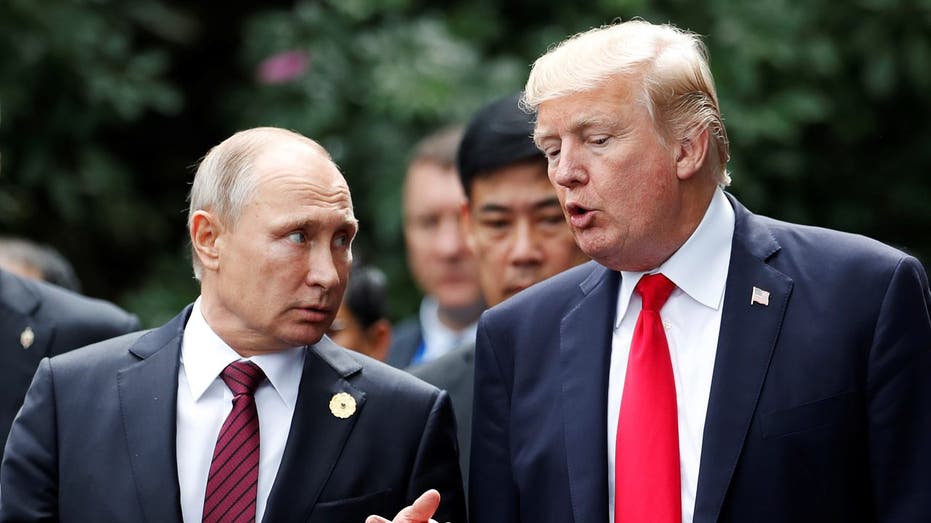
Russia is willing to work with President-elect Donald Trump to help improve relations with Ukraine so long as the U.S. makes the first move, Kremlin officials said this week, adding fresh momentum for the possibility of peace talks as its war in Ukraine threatens to stretch into a third year. Speaking to reporters Thursday in Moscow, Russian Foreign Minister Sergei Lavrov reiterated that Russia could be ready to come to the negotiating table regarding its “special military operation” in Ukraine— echoing the phrasing used by the Kremlin to describe its war in Ukraine — so long as the U.S. acted first. “If the signals that are coming from the new team in Washington to restore the dialogue that Washington interrupted after the start of a special military operation [the war in Ukraine] are serious, of course, we will respond to them,” Lavrov said in Moscow. But he stressed that the U.S. should move first, telling reporters that “the Americans broke the dialogue, so they should make the first move.” US SLAPS SANCTIONS ON COMPANIES TIED TO NORD STREAM 2 IN BID TO SQUEEZE RUSSIA His remarks come after Trump’s pick for Ukraine envoy, retired Lieutenant-General Keith Kellogg, told Fox News in an interview this month that both Russia and Ukraine appear to be willing to negotiate an end to the war — citing heavy casualties, damage to critical infrastructure, and a general sense of exhaustion that has permeated both countries as the war drags well past the thousand-day mark. “I think both sides are ready,” Kellogg said in the interview. “After a thousand days of war, with 350,000, 400,000 Russian [soldiers] down, and 150,000 Ukrainian dead, or numbers like that — both sides are saying, ‘okay, maybe this is the time, and we need to step back.’” To date, Russia has lost tens of thousands of soldiers in the war. As of this fall, an average of 1,200 soldiers were killed or injured per day, according to U.S. estimates. In Ukraine, the country’s energy infrastructure has seen extreme damage as the result of a protracted Russian bombing campaign, designed to collapse portions of the power grid, plunge the country into darkness, and ultimately, wear down the resolve of the Ukrainian people. PUTIN SAYS RUSSIA READY TO COMPROMISE WITH TRUMP ON UKRAINE WAR Most recently, Russia launched a Christmas Day bombardment against Ukraine’s power grid, directing some 70 cruise and ballistic missiles and 100 strike drones to hit critical energy infrastructure in the country. Ukrainian President Volodymyr Zelenskyy said the Christmas Day timing was a “deliberate” choice by Putin. “What could be more inhuman?” he said in a statement. Meanwhile, Ukraine’s military has lost around 40% of the land it seized in Russia’s Kursk region — a loss that could further erode morale. UKRAINE TO SEEK NATO INVITATION IN BRUSSELS NEXT WEEK Lavrov’s remarks also come as Kellogg prepares to travel to Ukraine in January for what he described to Fox News as an information-gathering trip. He declined to elaborate further on what he will aim to accomplish during the visit, saying only that he believes both countries are ready to end the protracted war — and that incoming President Trump could serve as the “referee.” “Think of a cage fight. You’ve got two fighters, and both want to tap out. You need a referee to kind of separate them.” Meanwhile, Russian President Vladimir Putin said Thursday that he is open to having the peace talks in the third country of Slovakia, citing an offer made by the country’s prime minister during a visit to the Kremlin earlier this week. It is unclear whether Ukraine would be willing to have the talks held in Slovakia, a country whose leaders have been vehemently opposed to sending more EU military aid to Ukraine. Ukraine did not immediately respond to Fox News’s request for comment on the peace talks, or whether it would be open to Slovakia’s offer to host.
WV Gov. Jim Justice to delay US Senate swearing-in, averting brief bedlam in Charleston
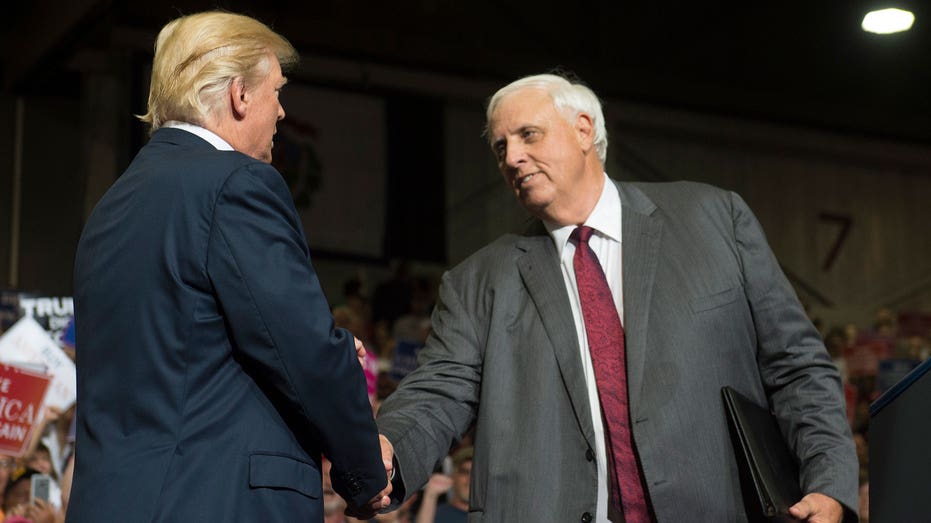
West Virginia Republican Gov. Jim Justice announced that he would delay his U.S. Senate swearing-in, thereby preventing a whirlwind of four governors in a 10-day period due to coinciding changes in Charleston’s legislative leadership. In doing so, it leaves federal Republicans’ Senate majority briefly at two instead of three seats. Justice alluded to such in remarks late Thursday, saying he wants to do what’s best for Mountaineers. “My whole thinking behind all of this is that the continuity of government is essential during transitions. . . . When I took this job, I took this job to serve the people of West Virginia.” Justice said he doesn’t expect much to happen between Jan. 3 – when Congress is sworn in – and Jan. 20 – when President-elect Donald Trump is inaugurated, but that in Charleston, many things might transpire. WV LAWMAKER ARRESTED AFTER THREATENING TO KILL ENTIRE REGION’S DELEGATION OVER CAUCUS BEEF West Virginia is one of seven states that does not have an independently-appointed or elected lieutenant governor. In Charleston, it is instead a statutory title given to the state Senate leader. So, if Justicewere to join the U.S. Senate on-schedule, current state Senate President Craig Blair would initially assume the role. However, Blair lost the GOP primary for his Martinsburg seat in April, and therefore leaves office on Jan. 8 when the new legislature is sworn in. On Jan. 8, the newly-selected leader, Sen. Randy Smith from Tucker County, would assume the governorship until Gov.-elect Patrick Morrisey took office on Jan. 13. “Between January 3rd and when President Trump takes office, there’ll be some things that happen, but there won’t be anything happening [in the U.S. Congress] really until when President Trump takes office,” Justice said Thursday. “I’m in constant contact with President Trump about my feelings about his selections for his appointments, my feelings about where we’re going to go on all kinds of issues like energy and on and on and on and everything,” he added. TRUMP, GOP CELEBRATE JOE MANCHIN RETIREMENT “So, I don’t think that there’s anything there that is going to rise to the level of what could happen here [in my absence].” Republicans also flipped the Senate by a comfortable-enough 53-47 margin that Justice’s absence will still allow a two-member buffer. “I don’t think that West Virginia needs to have four governors in 10 days,” he said. Justice said Thursday he made the decision after speaking about the situation with both the House Speaker and Senate Majority Leader-designate. “Senator Thune is really a good man. He’s going to do a great job as our leader and everything. And we had this discussion, and at the end of the day, I think you’ll find that everyone totally understands the complexities and everything and totally understands [my decision],” Justice said. Sen. Shelley Moore Capito, R-W.V., Justice’s counterpart next session, said she looks forward to serving with him and working together to advance Trump’s agenda. “I very much respect Governor Justice’s decision to honor his commitment to complete his term as Governor of the State of West Virginia,” she said in a statement. “I believe this with all my soul,” Justice further told reporters. “The people of West Virginia elected me to this office, and they expected me to do right by them always . . . t has been an honor beyond belief being their governor.” A billionaire coal businessman who also owns The Greenbrier in White Sulphur Springs, Justice was originally elected as a Democrat but changed parties during a 2017 rally with Trump in his first term in Charleston – and was re-elected as a Republican. Justice’s turn to the GOP and the retirement of Sen. Joe Manchin, D-W.V., completes a full shift from the blue state that for decades elected Sen. Robert Byrd and Rep. Nick Joe Rahall to a deep-red state that Democratic presidential candidates since Hillary Clinton have lost by double-digits. Bearing the wait until Jan. 13, Justice reiterated, will be worth it because he loves Trump “with all my soul.” “I think the world of his family and everything. And I’m going to be there [and] super supportive of what he’s doing. And we’re going to try in every way to . . . put this nation back on the right track.” “The people of West Virginia will know exactly where I stand with them.”
Former FBI and CIA chief urges senators to sink Patel, Gabbard
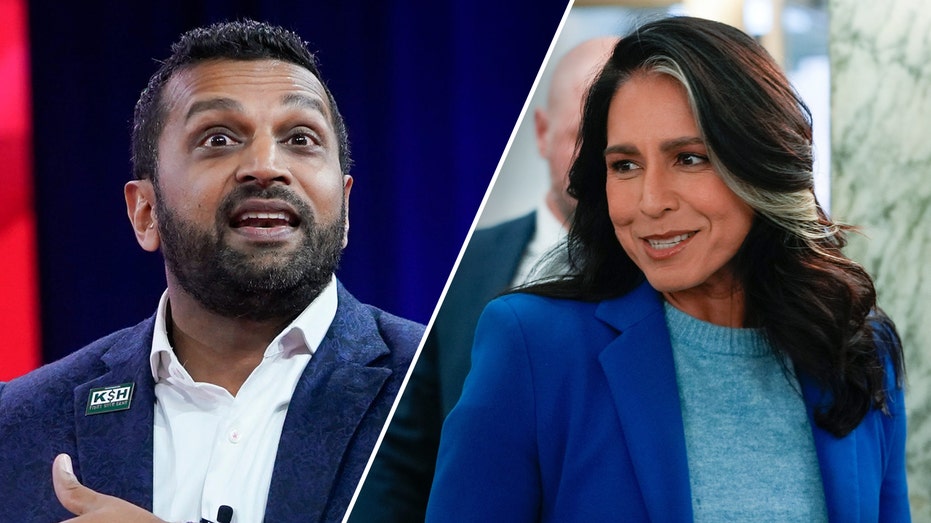
The Reagan-era director of the FBI, and later the CIA, is urging the Senate to reject two of President-elect Donald Trump’s selections for top law enforcement and intelligence posts. In a letter to senators on Thursday reported by Politico, former FBI and CIA director William Webster wrote that Kash Patel and Tulsi Gabbard are unqualified to be FBI director and director of national intelligence, respectively. Webster, who is 100 years old, is the only person to have led both the FBI and CIA. He warned senators that Patel’s personal loyalty to Trump could conflict with the FBI’s duty to uphold the rule of law. “His record of executing the president’s directives suggest [sic] a loyalty to individuals rather than the rule of law — a dangerous precedent for an agency tasked with impartial enforcement of justice,” he wrote, according to Politico. TRUMP FBI DIRECTOR PICK KASH PATEL ‘INSTRUMENTAL IN UNRAVELING’ RUSSIA COLLUSION HOAX, FORMER CHAIR SAYS As for Gabbard, Webster criticized her “profound lack” of intelligence experience and said a seasoned leader is needed for the DNI post. “Effective management of our intelligence community requires unparalleled expertise to navigate the complexities of global threats and to maintain the trust of allied nations,” he wrote. “Without that trust, our ability to safeguard sensitive secrets and collaborate internationally is severely diminished.” ‘WARRIOR WHOSE VOTE CANNOT BE BOUGHT’: HUNDREDS OF VETS POUR OUT IN SUPPORT OF TULSI GABBARD FOR DNI The Trump transition team defended the president-elect’s selection of Patel to lead the FBI. “Kash Patel is loyal to the Constitution. He’s worked under Presidents Obama and Trump in key national security roles,” said Alex Pfeiffer, a Trump transition team spokesman. Another transition official, Alexa Henning, observed that Webster had supported President Biden and Vice President Kamala Harris against Trump. “Lt. Col. Gabbard is an active member of the Army and has served in the military for over two decades and in Congress. As someone who has consumed intelligence at the highest levels, including during wartime, she recognizes the importance of partnerships with allies to ensure close coordination to keep the American people safe,” said Henning. Patel and Gabbard have proven to be two of Trump’s more controversial nominees for key positions in his next administration. WASSERMAN SCHULTZ SPARKS BACKLASH FOR CLAIMING TULSI GABBARD IS A RUSSIAN ASSET Patel was the chief investigator in the congressional probe into alleged Trump-Russia collusion, uncovering government surveillance abuse that led to the appointment of two special counsels who determined that there was never any collusion and the premise of the FBI’s original investigation was bogus. He has raised concern among top law enforcement professionals for his outspoken criticism of the FBI and Justice Department, accusing them of partisanship. Gabbard, a former Democratic congresswoman and military officer from Hawaii, is likewise under scrutiny after she met with since-toppled Syrian dictator Bashar al-Assad in 2017, who was accused of using chemical weapons on his own citizens during the country’s civil war. Gabbard refused to call him a war criminal during her 2020 presidential campaign and said she was skeptical that his government had perpetrated a chemical weapons attack earlier that year that had killed dozens of Syrians. However, she later called Assad a brutal dictator. Webster was appointed to direct the FBI by President Jimmy Carter in 1978, and he remained atop the bureau under President Ronald Reagan’s two terms in office. In 1988, Webster became director of the CIA under President George H.W. Bush and served through 1991. “I urge you to weigh the critical importance of nonpartisan leadership and experience,” Webster wrote. “The safety of the American people — and your own families — depends on it.”
Trump tells EU to buy more American-made oil and gas or face ‘tariffs all the way’
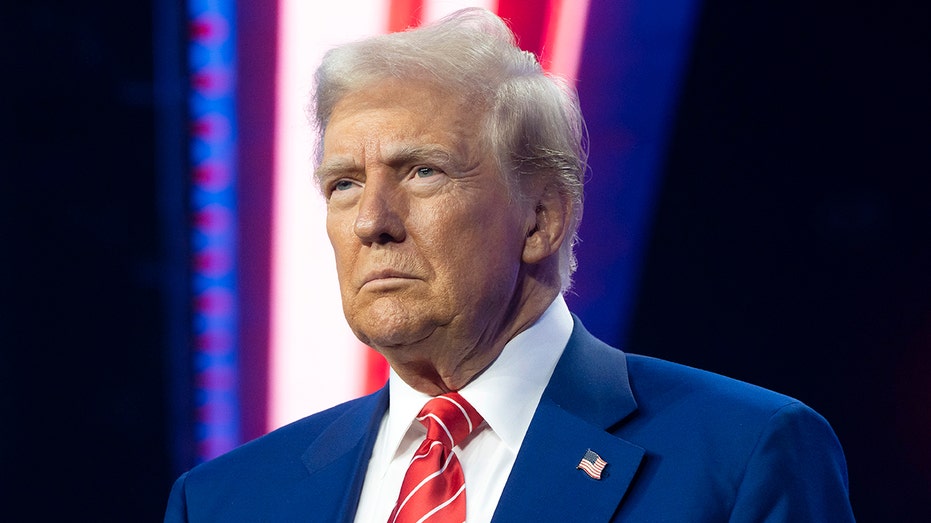
President-elect Donald Trump is threatening tariffs against a bloc of countries when he assumes office as part of his anticipated effort to reinforce oil and gas production in the U.S. Trump, in a Truth Social post, said that he told the European Union that if it doesn’t begin to import more U.S. oil and gas, it will be faced with tariffs under his upcoming presidency. “I told the European Union that they must make up their tremendous deficit with the United States by the large scale purchase of our oil and gas,” Trump wrote. “Otherwise, it is TARIFFS all the way!!!” Throughout his presidential campaign, Trump vowed to restore energy dominance by bolstering the production of American-made oil and natural gas. Specifically, Trump has revealed that he plans to expand fracking and lift President Joe Biden’s pause on new liquefied natural gas (LNG) export permits. TRUMP SUGGESTS CANADA BECOME 51ST STATE AFTER TRUDEAU SAID TARIFF WOULD KILL ECONOMY: SOURCES Trump’s latest tariff threat comes amid a number of warnings against several countries, including China, Mexico, and Canada, if they don’t act to secure the border and stop drug trafficking. MAJORITY OF AMERICANS OPTIMISTIC ABOUT TRUMP AGENDA, POLL FINDS, DESPITE TARIFF CONCERN Trump said he would impose 25% tariffs on all Canadian and Mexican exports, unless the countries work to stop the flow of illegal immigration and illicit drugs coming into the U.S. After Trump’s proposed tariff against Canada, Ontario Premier Doug Ford threatened to cut off energy and critical mineral exports to the U.S. if the incoming president implements such a tariff on all Canadian products. However, Trump was unfazed by the threat, saying, “That’s okay if he does that.” Trump has reportedly engaged in “very productive” conversations with Canadian Prime Minister Justin Trudeau since threatening a new tax. The PM traveled to Mar-a-Lago to meet with the incoming president, where Trudeau reportedly told Trump he couldn’t levy the tariff, because it would kill the Canadian economy completely, Fox News previously reported. Trump then suggested to Trudeau that Canada become the 51st state, which, according to sources, reportedly caused the prime minister and others to laugh nervously. Fox News’ Bret Baier and Greg Wehner contributed to this report.
Musk and Ramaswamy ignite MAGA war over skilled immigration and American ‘mediocrity’
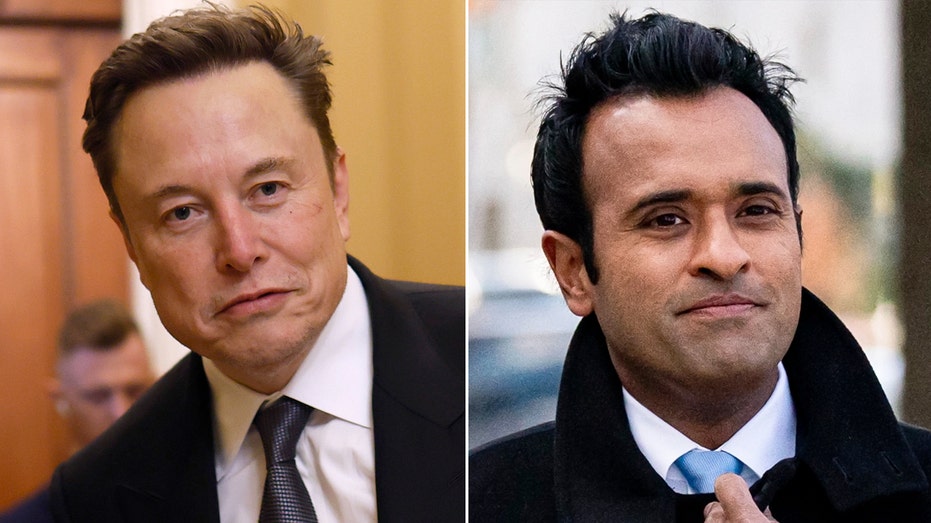
Trump world warriors Elon Musk and Vivek Ramaswamy have ignited an intra-MAGA battle with their proposals to increase immigration visas for high-skill workers. Musk and Ramaswamy, who have been tapped by President-elect Donald Trump to lead his Department of Government Efficiency (DOGE), argued that American culture has not prioritized education enough, and therefore foreign workers are needed for tech companies like Musk’s SpaceX and Tesla. The pair saw their conservative sway skyrocket throughout the 2024 election as they grew closer to Trump, but the wealthy businessmen now find themselves butting heads with Trump’s most ardent base that wants to see Trump make good on promises of immigration restrictions and promoting the U.S. labor workforce. Trump restricted access to foreign worker visas during his first administration and has critiqued the H-1B visas program, which allows U.S. companies to hire foreign workers in specialty occupations. “There is a permanent shortage of excellent engineering talent. It is the fundamental limiting factor in Silicon Valley,” Musk wrote on X, arguing the tech industry needs to “double” the number of engineers working in the U.S. today. ‘WE’RE GOING TO GUT THE FISH’: REPUBLICANS GIVE DETAILS FROM CLOSED-DOOR MEETINGS WITH DOGE’S MUSK, RAMASWAMY “The number of people who are super-talented engineers AND super motivated in the USA is far too low,” he added. Musk likened recruiting foreign workers to assembling a sports team. “You need to recruit top talent wherever they may be. That enables the whole TEAM to win.” Ramaswamy, whose parents immigrated to the U.S. from India, backed up Musk and took shots at American society. “American culture has venerated mediocrity over excellence,” he wrote on X. “A culture that celebrates the prom queen over the math olympiad [sic] champ, or the jock over the valedictorian, will not produce the best engineers.” Those comments didn’t sit well with conservative crusaders like pundit Ann Coulter, commentator Laura Loomer, former Rep. Matt Gaetz and even former U.N. Ambassador Nikki Haley. GOP SENATORS ‘VERY IMPRESSED’ WITH MUSK, RAMASWAMY DOGE FRAMEWORK AMID MEETINGS ON CAPITOL HILL “There is nothing wrong with American workers or American culture,” Haley wrote in a post on the social platform X. “All you have to do is look at the border and see how many want what we have. We should be investing and prioritizing in Americans, not foreign workers.” Haley and Ramaswamy have a long history of butting heads, starting with their competition in the 2024 Republican primary. “We welcomed the tech bros when they came running our way to avoid the 3rd grade teacher picking their kid’s gender – and the obvious Biden/Harris economic decline,” Gaetz, R-Fla., wrote in a social media post on Thursday. “We did not ask them to engineer an immigration policy.” Right-wing rabble-rouser Loomer said: “Our country was built by white Europeans, actually. Not third-world invaders from India. It’s not racist against Indians to want the original MAGA policies I voted for. I voted for a reduction in H-1B visas. Not an extension.” The skirmish kicked up after Trump nominated venture capitalist Sriram Krishnan to serve as his AI policy adviser. That nomination triggered anti-Indian backlash, and critics highlighted his past support for lifting the cap on green cards. “The Woodstock generation managed to build out aerospace, the one before went to the moon, America was doing great. Underlying your post is that we were all living in squalor until being rescued by H-1B’s. Then why did everyone want to come here?” right-wing personality Mike Cernovich responded to Ramaswamy on X.

